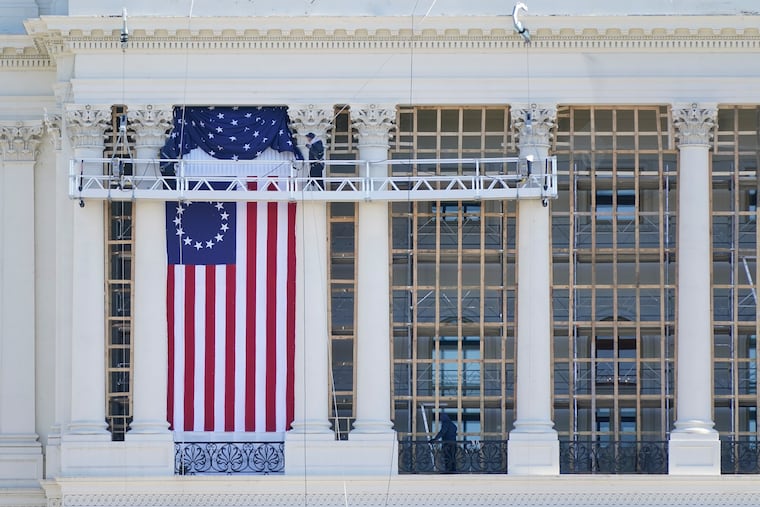Our democracy remains intact, thanks to our courts, free press, and right to assembly | Opinion
The foundations of the American Experiment remain durable.

Under the headline, “A divided nation asks: What’s holding our country together?” a Dec. 27 Associated Press article noted that, “The foundations of the American experiment have been shaken — by partisan rancor, disinformation, a president’s assault on democracy and a deadly coronavirus pandemic.”
Although shaken, they remain durable because an independent judiciary has protected, and individuals exercised, constitutional freedoms, especially the mutually reinforcing ones of speech, press, petition, peaceable assembly, and the opportunity to vote — to bend the arc of the country’s history toward justice.
» READ MORE: America hit rock bottom on January 6, 2021. Will there be an epiphany? | Will Bunch
The role of the courts in protecting basic rights: The right to freely and fairly choose the nation’s leaders is a hallmark of a representative system of government. Because that right is protected by a governmental branch that deals in fact, not fabulation, and proof, not conjecture, the outcome of the 2020 election was not undone by what judges recognized as “speculative accusations … unsupported by evidence” and “inadmissible hearsay within hearsay…” As federal District Court Judge Diane J. Humetewa put it when dismissing a suit in Arizona, “Allegations that find favor in the public sphere of gossip and innuendo cannot be a substitute for earnest pleadings and procedure in federal court.”
The role of the press in exposing injustice: The fact that the AP, in existence since 1846, could, without fear of governmental retribution, identify the behavior of an incumbent president as a factor destabilizing a country’s foundations is another sign that their footings are intact. Protected by the First Amendment, it was journalists who exposed the deceptions of leaders about the Vietnam War, Watergate, Iran Contra, and the COVID-19 pandemic, revealed the abuses at Abu Ghraib prison and Guantanamo Bay, and alerted the public to the Trump administration’s separation of children from their families at the border.
That same constitutional guarantee protected the right of television stations to carry the images of peaceful protestors, including 25-year-old chair of the Student Nonviolent Coordinating Committee (SNCC), John Lewis, being beaten by Alabama state troopers on the Edmund Pettus Bridge in Selma in 1965, and in 2020 of George Floyd dying under the knee of a Minneapolis police officer. The former propelled enactment of the Voting Rights Act of 1965. The latter, a ban on “neck restraints” in 32 of the 65 largest police departments and promises of police reform from the person who will assume the presidency Jan. 20.
The power of an unfettered press also was on display last week when broadcasters documented a president inciting an insurrection that profaned the nation’s Capitol, the resolute return of our elected representatives to those chambers, and their confirmation early the next morning that a new president and vice president had been elected. In reports and editorials, journalists and outraged members of the public condemned the president’s appeals and the mob’s actions as leaders reminded the president that the Constitution contains the means of removing a president from office through impeachment, or exercise of the 25th Amendment.
The role of speech, assembly, and petition in making real the promises of democracy: John Lewis, Martin Luther King Jr., and Benjamin Franklin each used their constitutionally protected freedoms to tell the public and those in power that, in King’s words, “Now is the time to make real the promises of democracy.” In the final months of his life, for example, Franklin drew on the language of the founding documents to urge Congress to grant liberty to those “degraded into perpetual bondage.” Where the printer whose birth we celebrate on Jan. 17 dispatched his petition in print, the preacher born more than two centuries later on Jan. 15 peaceably assembled more than a quarter-million people in front of the Lincoln Memorial on a hot August day in 1963.
Lewis, who was on the same stage as King at that 1963 March on Washington for Jobs and Freedom, was just 25 years old when, two years later, he led peaceful protesters across that bridge in Selma, Ala., where they encountered club-wielding Alabama state troopers who fractured Lewis’ skull. When President Lyndon Johnson submitted the Voting Rights Act of 1965 to Congress eight days later, he called Selma a “turning point in man’s unending search for freedom” akin to Lexington, Concord, and Appomattox.
» READ MORE: Rep. Brendan Boyle: I never imagined I’d live through an insurrection at the Capitol | Opinion
Those who doubt that the voices and actions of individuals can advance the cause of justice might recall that, thanks in part to the Voting Rights Act, a record number of Americans voted in 2020. Those who doubt the resilience of our institutions might recall that secretaries of state, judges, and both Democrats and many Republicans who serve in the U.S. House and Senate protected the integrity of the 2020 presidential ballots. And those who surmise that rancor and division will inevitably win the day might take note that Alabama state troopers saluted as Lewis’ flag-draped casket crossed the Edmund Pettus Bridge in July. And the major networks, including Fox News, preempted their regular programming to carry his funeral.
Kathleen Hall Jamieson is the director of the Annenberg Public Policy Center of the University of Pennsylvania and recipient of the 2021 Benjamin Franklin Founders award, to be presented at the Benjamin Franklin Birthday Celebration on Jan. 15 as an online event with free registration.